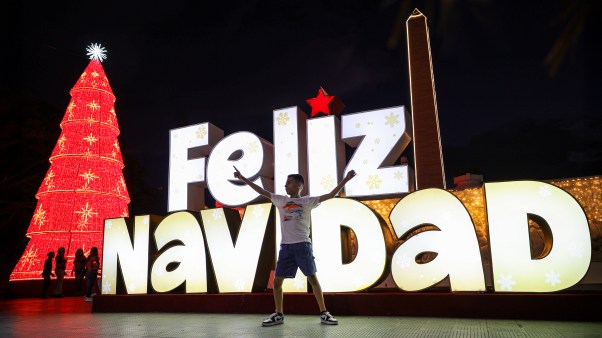In Venezuela, a gardener from the countryside heralds the beginning of the Christmas season. For years, the legend goes, Antonio Pacheco traveled from Galipán, a town in the northern mountains, to capital city Caracas, arriving with his flowers to sell each December. When he arrived at the Plaza Bolívar on the first of the month, his appearance signaled the advent of cold temperatures and Christmastime.
This year, when Pacheco arrived via the local reenactment, he discovered a Christmas season in full swing, with a large Christmas tree in the center of the square, lights adorning every major building, and an illuminated placard wishing “Feliz Navidad” to passers-by. In fact, some of the decorations had begun to fade, having been up for two months. According to the official state calendar, Christmas began on October 1.
Traditionally, the Christmas holidays begin with the Catholic Feast of the Immaculate Conception of the Virgin Mary on December 7 and end with Epiphany on January 6. But in recent years, the dates have been malleable.
In 2020, president Nicholas Maduro announced that Christmastime would begin on October 15. The next year, as the country was recovering from the COVID-19 pandemic and successive lockdowns, he ordered the festive season to begin on October 4. Last year, he told his TikTok followers, “Merry Christmas beginning November 1. Baby Jesus is coming!”
For this year’s October declaration, one that came just weeks after an internationally disputed election, the president’s communication team published a PSA featuring smiling Venezuelan children and senior citizens, and reporters on the official state news channel played footage of citizens enjoying Christmas lights.
Maduro decreed that the government put up Christmas decorations in public offices and parks. The government erects special lights in places like Plaza Bolívar and Plaza Los Símbolos. Waraira Repano National Park illuminated their iconic cross. (This year, oppositionist media reported that the government had imposed fines on businesses that refused to put up Christmas decorations early.)
As in previous years, the government, through the Local Supply and Production Committees (CLAP), increased the amount of food it delivered in the poorest neighborhoods, prioritizing areas with a dense population of Chavistas, or those ideologically aligned with the socialism of Hugo Chávez, who ruled Venezuela between 1999 and 2013.
This year, Venezuela’s Ministry of Education also issued a press release stating that, starting October 1, schools must offer “pedagogical, artistic, and cultural activities that reflect the ancestral roots, customs, and traditions” of Christmas in Venezuela.
Despite the government’s proclamations, the church’s calendar seemingly hasn’t shifted.
“The manner and timing of its celebration is the responsibility of the ecclesiastical authority,” the Venezuelan Bishops’ Conference (CEV) stated shortly after this year’s Christmas announcement. “This holiday must not be used for propagandistic or particular political purposes.”
The evangelical pastors contacted by CT preferred not to comment on the early Christmas, due to the political tension in the country. But the social media of some of the largest churches in Venezuela, such as the Iglesia Maranatha, Asambleas de Dios, or the Iglesia Pentecostal Unida, did not include posts about Christmas during October and November. (In October, as evidenced in their Instagram posts, many congregations of all denominations did observe the Month of the Bible.)
Instead, only since December 1 have most churches, both evangelical and Catholic, been promoting cantatas, themed services, and Advent celebrations and begun singing villancicos (Christmas carols) on Sunday mornings.
“To declare Christmas extemporaneously is to turn it into a festival of waste and spending,” said Cardinal Baltazar Porras, former archbishop of Caracas, whose resignation was accepted by Pope Francis just a month before the presidential elections on July 28.
“Curiously, what is promoted has nothing to do with Venezuelan identity but with little trees, snow, reindeer, and figures foreign to our culture that try to make us believe that we are happy and content because we live very well here, forgetting the prisoners, the torture, and the lack of freedom.”
Other Venezuelans who have stood up to Maduro share this cynicism.
“This measure seeks to associate Maduro’s image with well-being and joy in an attempt to monopolize popular sentiment,” Miguel Ángel Martín, the former president of the Venezuelan Supreme Court, currently exiled in the United States, told Christianity Today.
Though Maduro declared victory in the July 28 elections, the opposition has accused him of election fraud, a claim shared by foreign observers and the United States. The government has arrested at least 1,300 people who protested the results. The opposition has also blamed state security for sanctioning the deaths of at least 21 people.
To political unrest, social and economic problems have been added. According to a survey from the Universidade Católica Andrés Bello, 50.5% of Venezuela’s population lives in extreme poverty, despite being home to the biggest oil reserves in the world. Persistent crises have triggered an intense wave of migration. The United Nations estimates that 7.7 million Venezuelans currently live abroad. (The in-country population is 29.4 million.)
“The intention of forcing a Christmas atmosphere seeks to empty the meaning that the church gives to this celebration of content and tries to replace it, presenting it as a superficial palliative in the face of social discontent,” saidTeresa Flores, director of the Observatory of Religious Freedom for Latin America, based in Lima, Peru.
But Ender Urribarrí, who pastors Encuentro con Dios church in Colonia Tovar, a town located 60 kilometers east of Caracas, sees an extended opportunity for evangelism.
“I wish it were not just three months that Christmas was celebrated,” he said, “but all year round.”
Hernán Restrepo is a Colombian journalist who lives in Bogotá. Since 2021, he has managed the social media accounts of Christianity Today in Spanish.













